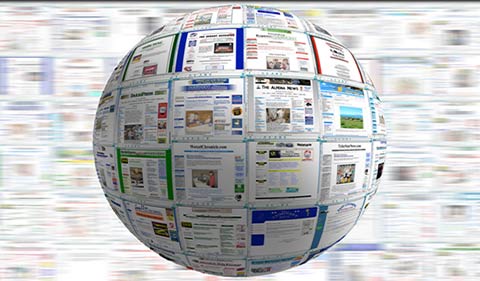当前位置: Language Tips> 双语新闻
|
 In a move aimed at helping newspapers generate new revenue from struggling online operations, the German government intends to require search engines and other Internet companies to pay publishers whose content they highlight. |
|
In a move aimed at helping newspapers generate new revenue from struggling online operations, the German government intends to require search engines and other Internet companies to pay publishers whose content they highlight. The German governing coalition, led by Chancellor Angela Merkel’s Christian Democratic Union, said last week that it planned to introduce legislation to create a new kind of copyright for online publishers. Under the proposal, Internet aggregators and search engines would have to pay the publishers if they wanted to display all or parts of their articles — even small snippets like those that are shown in search links. The proposal was cheered by German publishers, who complain that Internet companies like Google have profited hugely from their content, while generating only scraps of digital revenue. “In the digital age, such a right is essential to protect the joint efforts of journalists and publishers,” the Federation of German Newspaper Publishers said, adding that it was “an essential measure for the maintenance of an independent, privately financed news media.” But the announcement set off howls of protest from Internet companies and bloggers, who said the proposal could threaten free speech and stunt the development of the digital economy in Germany. The proposal, in an announcement of the coalition’s legislative agenda, follows intense lobbying by publishers, after the idea was initially put forward several years ago. The plan authorizes ministers to draft a bill, which is expected to go to the Bundestag, the lower house of Parliament, this summer. The proposal addresses a debate that has raged since the early days of the Internet: Who benefits more from digital links and the traffic they generate — search engines, aggregators and other online hubs, or the sites that produce the content? Google does not sell advertising on its German news aggregation service, which displays snippets of articles and links to the originating sites. But the company earns billions of euros from advertising on its search engine and other services. Most German newspaper publishers, on the other hand, generate only minuscule revenue online from advertising or other sources, like so-called pay walls around their content. (Read by Nelly Min. Nelly Min is a journalist at the China Daily Website.) (Agencies) |
为了帮助萎靡不振的网上报纸业务获得新收入来源,德国政府拟要求搜索引擎和其他互联网公司,在页面突出显示这些报纸的内容时付费给报社。 以德国总理默克尔为首的基督教民主联盟领导的联合政府上周表示,计划立法为互联网出版商制定新的版权条例。按照这项计划,网络新闻聚合器和搜索引擎如要登载报纸的全篇或者部分内容,甚至是那些出现在搜索链接中的词条,都须付费给对方。 这一计划使德国出版商备受鼓舞,他们抱怨谷歌等互联网公司从登载他们的内容中获取了巨额利润,而产生的数字业务费用只不过是九牛一毛。 德国报纸出版商联盟说:“在数字时代,制定这类版权是对记者和出版商共同成果的保护”,该联盟还补充说,这是“维持独立的私营新闻媒体的必要举措”。 但是这一宣布引起了互联网公司和博客使用者的抗议,他们认为这一计划将会危及言论自由,并且阻碍德国数字经济的发展。 联盟的立法议程里宣布了这一计划。该计划一宣布出版商们便积极进行游说,事实上这一想法早在几年前就已经提出。 这个计划授权部长们草拟法案,预计今天夏天将提交给德国联邦议院,即下议院,进行表决。 这一计划引发了自互联网产生不久便风行的一场争论:谁是数据链接和由此产生的网络流量的更大赢家?搜索引擎,聚合器,其他的网络信息枢纽,还是产生源信息的网页? 谷歌在德国的新闻聚合服务可显示原创网站的文章片段和链接,不过谷歌并没有用这种服务卖广告。但是,谷歌通过自身的搜索引擎和其他服务的广告赚取了数十亿欧元的利润。 而另一方面,大多数德国报纸出版商只能通过广告或付费阅读等其他渠道获取极少的网络收入。 相关阅读 (中国日报网英语点津 陈丹妮 编辑:Julie) |
|
Vocabulary: stunt: 阻碍 Bundestag: 德国联邦议院,德国众议院 minuscule: 微小的 |
上一篇 : 加州大学或要求申请学生写明性取向
下一篇 : 《雷锋日记》节选之六(双语对照)
电话:8610-84883645
传真:8610-84883500
Email: languagetips@chinadaily.com.cn